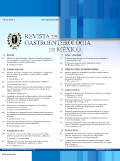
BMC GASTROENTEROLOGY
Scope & Guideline
Uniting Knowledge and Innovation in Gastroenterology
Introduction
Aims and Scopes
- Clinical Research in Gastroenterology:
The journal publishes original clinical studies that explore various gastrointestinal disorders, including inflammatory bowel disease, liver diseases, and gastrointestinal cancers. These studies often assess treatment efficacy, patient outcomes, and quality of life. - Innovative Diagnostic Techniques:
BMC Gastroenterology highlights advancements in diagnostic methodologies, such as endoscopic techniques, imaging modalities, and biomarkers for early detection of gastrointestinal diseases. - Therapeutic Strategies and Management:
Research focusing on novel therapeutic interventions, including pharmacological treatments and surgical techniques, is a core area. This includes studies on biologics, endoscopic procedures, and multidisciplinary approaches to treatment. - Epidemiological Studies:
The journal also emphasizes the importance of epidemiological research that investigates the prevalence, risk factors, and outcomes of gastrointestinal diseases across different populations. - Molecular and Genetic Research:
Research exploring the molecular and genetic underpinnings of gastrointestinal diseases is included, contributing to the understanding of disease mechanisms and potential therapeutic targets.
Trending and Emerging
- Artificial Intelligence in Gastroenterology:
There is a rising interest in the application of artificial intelligence and machine learning techniques for diagnostic and predictive purposes in gastroenterology, showcasing the integration of technology in clinical practice. - Personalized Medicine and Targeted Therapies:
Research focusing on personalized medicine, particularly in the context of inflammatory bowel disease and hepatocellular carcinoma, is increasingly prevalent as clinicians seek tailored treatment strategies. - Gut Microbiome Research:
Studies exploring the gut microbiome's role in gastrointestinal health and disease, including its impact on treatment efficacy and disease mechanisms, are emerging as a significant area of interest. - Telemedicine and Remote Monitoring:
In light of recent global events, research on telemedicine applications for gastrointestinal care, including remote monitoring and consultations, has gained momentum, reflecting the changing landscape of healthcare delivery. - Longitudinal and Cohort Studies:
There is a trend towards more longitudinal studies and cohort analyses that investigate the long-term outcomes of gastrointestinal diseases, emphasizing the importance of sustained patient follow-up.
Declining or Waning
- Traditional Surgical Techniques:
There has been a noticeable decline in studies focusing solely on traditional surgical techniques for gastrointestinal disorders, as newer minimally invasive and endoscopic approaches gain traction. - Basic Science Research:
Research that primarily emphasizes basic science without direct clinical application is becoming less common. The journal appears to favor studies with immediate relevance to clinical practice. - Single-Center Studies:
The prevalence of single-center studies has decreased, as there is a growing emphasis on multicenter and larger cohort studies that enhance the generalizability of findings. - Uncontrolled Trials:
There is a waning interest in publishing uncontrolled trials or studies lacking robust methodological frameworks, as the journal increasingly prioritizes well-designed, controlled studies. - Outdated Diagnostic Techniques:
Research focusing on older diagnostic methods that have been largely replaced by newer technologies is becoming infrequent, aligning with the journal's emphasis on innovation.
Similar Journals

Turkish Journal of Gastroenterology
Pioneering Research for Digestive WellnessTurkish Journal of Gastroenterology is a distinguished publication in the field of gastroenterology, published by AVES in Turkey. With its Open Access format since 2022, the journal facilitates expansive dissemination of research findings, catering to an audience of researchers, healthcare professionals, and students eager to stay abreast of the latest advancements in the field. The journal has maintained a reputable standing with an impressive Q3 category ranking in Gastroenterology as of 2023, recognizing its contributions to expanding knowledge and fostering innovation in gastrointestinal health. Spanning from 1996 to 2024, the Turkish Journal of Gastroenterology commits to publishing high-quality, peer-reviewed articles that engage and inform its audience while addressing key challenges and breakthroughs in the field. The journal's presence in Scopus and its rank of #108 out of 167 in Medicine Gastroenterology further underscore its relevance and increasing impact within the academic community.

Pediatric Gastroenterology Hepatology & Nutrition
Transforming knowledge into practice for healthier futures.Pediatric Gastroenterology Hepatology & Nutrition is a pivotal academic journal published by the Korean Society of Pediatric Gastroenterology & Nutrition, focusing on the critical fields of pediatric gastroenterology, hepatology, and nutrition. Located in South Korea, this journal aims to disseminate high-quality research, review articles, and clinical studies to advance knowledge and practice in the care of children with gastrointestinal and nutritional disorders. With a Converged Years span from 2012 to 2024 and categorized in the Q2 and Q3 quartiles in 2023 across multiple related fields, the journal holds a significant position within the academic community, reflecting its impactful contribution to the discipline. Although currently not open access, the journal ensures that content is accessible to a broad audience through various institutional subscriptions. The journal appeals to researchers, healthcare professionals, and students alike, providing an essential platform for the exchange of innovative ideas and research findings aimed at improving pediatric patient care.

EUROPEAN JOURNAL OF GASTROENTEROLOGY & HEPATOLOGY
Connecting researchers to the forefront of digestive science.The EUROPEAN JOURNAL OF GASTROENTEROLOGY & HEPATOLOGY, published by LIPPINCOTT WILLIAMS & WILKINS, serves as a key platform for disseminating cutting-edge research in the fields of gastroenterology and hepatology since its inception in 1989. With its ISSN 0954-691X and E-ISSN 1473-5687, the journal has established a prominent reputation, as reflected in its 2023 rankings, placing it in Q2 for Gastroenterology and Q3 for Hepatology. It is ranked #75 out of 167 in gastroenterology and #39 out of 82 in hepatology according to Scopus, highlighting its importance in advancing knowledge and clinical practices. While it does not currently offer open access options, the journal remains essential for researchers, healthcare professionals, and students seeking to stay abreast of significant developments and innovations in digestive health. By providing rigorous peer-reviewed articles, the EUROPEAN JOURNAL OF GASTROENTEROLOGY & HEPATOLOGY continues to contribute to the understanding and treatment of gastrointestinal and liver diseases, making it a vital resource in the medical community.

Revista de Gastroenterologia de Mexico
Elevating Knowledge in Gastroenterology, GloballyRevista de Gastroenterologia de Mexico, published by Elsevier, serves as a vital platform for advancing knowledge in the field of gastroenterology. Established in Mexico, this esteemed journal boasts an open access format since 2012, promoting widespread dissemination of research findings and enhancing access for healthcare professionals and researchers worldwide. With its impact factor reflecting a growing recognition in the academic community, the journal is currently ranked in the Q3 category for Gastroenterology, indicating its relevance and contribution to the field. Spanning decades of publication history from 1947 to the present, it offers a wealth of medical insights and serves as a critical resource for those engaged in clinical practice and research. The journal aims to publish high-quality original research, reviews, and clinical studies, making it an essential resource for professionals seeking to stay at the forefront of gastroenterological advancements. Located at Radarweg 29, 1043 NX Amsterdam, Netherlands, the journal embraces a holistic approach to gastroenterology, encouraging contributions that enrich the understanding and treatment of gastrointestinal disorders.

World Journal of Gastrointestinal Oncology
Exploring groundbreaking studies in gastrointestinal oncology.World Journal of Gastrointestinal Oncology, published by BAISHIDENG PUBLISHING GROUP INC, stands as a pivotal resource in the evolving fields of gastroenterology and oncology, particularly focused on the intricate relationship between gastrointestinal disorders and cancer. Established in 2014, the journal continues to publish influential research, boasting a commendable Q2 ranking in both the gastroenterology and oncology categories for 2023, which underscores its importance in these critical medical domains. With a diverse range of topics and studies, it serves as an essential platform for researchers, healthcare professionals, and students aiming to stay informed about the latest advancements and innovations in gastrointestinal oncology. Though currently not classified as open access, the journal's rigorous peer-review process ensures the dissemination of high-quality research that significantly contributes to clinical practice and patient care. Its positioning in the Scopus rankings also highlights its competitive standing within the scientific community, fostering discussions that are crucial for advancing both fields. Explore the latest insights and findings to enhance your understanding and contribute to the ongoing dialogue in gastrointestinal health and oncology.

World Journal of Gastrointestinal Endoscopy
Advancing the Frontiers of Gastrointestinal EndoscopyWorld Journal of Gastrointestinal Endoscopy, an esteemed publication under the BAISHIDENG PUBLISHING GROUP INC, plays a pivotal role in advancing the field of gastroenterology through its dedicated focus on cutting-edge research and innovative practices in gastrointestinal endoscopy. With a commitment to facilitating the dissemination of knowledge, this journal seeks to provide a platform for researchers, clinicians, and academic professionals to share their findings and insights into the latest endoscopic techniques, technologies, and applications. The journal aims to foster collaboration and improve patient outcomes through rigorous peer-reviewed articles that encompass a broad range of topics within gastrointestinal endoscopy. With its impact on shaping clinical practices and influencing future research directions, the World Journal of Gastrointestinal Endoscopy is an essential resource for anyone in the field, remaining accessible through various academic channels, including institutional libraries and individual subscriptions.

Canadian Journal of Gastroenterology and Hepatology
Exploring Innovations in Liver and Gastrointestinal HealthCanadian Journal of Gastroenterology and Hepatology, published by HINDAWI LTD, serves as a vital resource in the fields of gastroenterology and hepatology. Since its inception in 1987, this open-access journal has made significant contributions to advancing research and clinical practice through its comprehensive coverage of topics ranging from liver diseases to gastrointestinal disorders. With an impressive Q2 ranking in Gastroenterology and a Q3 ranking in Hepatology as of 2023, the journal has established itself as an influential platform for researchers and healthcare professionals seeking to disseminate and acquire knowledge. The journal is based in Egypt, with its operational headquarters located in London, England. Notably, it holds a respectable standing in Scopus rankings, placed at Rank #64 in Gastroenterology and Rank #34 in Hepatology, reflecting its impact and relevance in the medical community. With a commitment to quality and accessibility, the Canadian Journal of Gastroenterology and Hepatology continues to foster innovation and collaboration among its readers.

Gastrointestinal Disorders
Innovating Insights in Gastroenterology and BeyondGastrointestinal Disorders is a prominent open-access journal published by MDPI, based in Switzerland, that focuses on the latest research and innovations in the fields of gastroenterology, hepatology, and immunology. Since its inception in 2019, the journal has provided a vital platform for researchers and professionals to disseminate their findings, engaging with a global audience keen on advancing knowledge in gastrointestinal health. With a dedicated commitment to high-quality, peer-reviewed articles, Gastrointestinal Disorders has gained recognition in 2023, achieving Q3 status in gastroenterology and notable rankings in several other categories, including a respectable position in the quartiles for hepatology, immunology, and oncology. Despite its recent establishment, the journal has quickly become a valuable resource, facilitating open access to critical insights in the study of gastrointestinal diseases and their management, ensuring that emerging research is readily available to inform clinical practice and educate future professionals.

GUT
Elevating Gastroenterology Through Rigorous ScholarshipGUT is a premier journal in the field of gastroenterology, published by the esteemed BMJ Publishing Group. With a rich history dating back to 1960 and an impressive convergence of research expected to continue through 2024, GUT has established itself as a cornerstone of academic discourse in the gastrointestinal sciences. The journal boasts a remarkable impact factor, positioning it in the Q1 category for gastroenterology with an outstanding rank of #3 out of 167 in its Scopus ranking, reflecting its 98th percentile status among peers. Although it does not currently offer open access options, GUT remains dedicated to disseminating high-quality research, reviews, and clinical studies that advance the understanding of digestive health. Published in the United Kingdom, GUT serves as an essential resource for researchers, clinicians, and students aiming to stay at the forefront of innovations and developments in the field.

Korean Journal of Gastroenterology
Fostering Global Dialogue on Digestive HealthKorean Journal of Gastroenterology (ISSN: 1598-9992, E-ISSN: 2233-6869), published by the Korean Society of Gastroenterology, has been a premier outlet for research and advancements in the field of gastroenterology since its inception in 1968. This open-access journal, based in South Korea, fosters a global dialogue on gastrointestinal health, embracing contributions from a diverse array of disciplines within medicine. It is currently ranked in the Q4 quartile for miscellaneous medicine and holds a Scopus rank of #323 out of 636 in general medicine, reflecting its commitment to publishing impactful research despite its relatively recent establishment in high-impact metrics. With a continuous publication timeline extending through to 2024, the journal aims to enhance understanding of gastrointestinal disorders and promote innovative treatments, making it an essential resource for researchers, clinicians, and students alike who seek to stay abreast of the latest developments and clinical applications in gastroenterology.